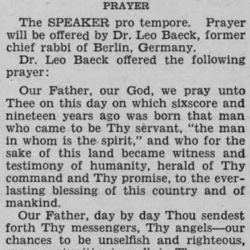Date of Prayer: 12 February 1948
Sponsor: n/a
| Contribute a translation | Source (English) |
|---|---|
Our Father, our God, we pray unto Thee on this day on which sixscore and nineteen years ago was born that man who came to be Thy servant, “the man in whom is the spirit,” (Numbers 27:18) and who for the sake of this land became witness and testimony of humanity, herald of Thy command and Thy promise, to the everlasting blessing of this country and of mankind. | |
Our Father, day by day Thou sendest forth Thy messengers, Thy angels— our chances to be unselfish and righteous, our opportunities to walk in Thy ways— they are the messengers that come from Thee. We must not miss them nor disregard them. | |
Almighty God, Thou choosest people and selectest nations “to bring them into the place which Thou hast prepared”; (Exodus 15:17) Thou changest the times and the seasons; Thou makest history enter the world. Thy servant, Abraham Lincoln, in a message to Congress, said, “We cannot escape history,”[1] Abraham Lincoln in his Annual Message to Congress, 1 December 1862. so help us, O God, that we may not evade history, but may we be granted history. | |
Reverently I pray Thee to bless Congress, its men, and its days. From the bottom of my heart I pray: God bless America. |
This prayer of the guest chaplain was offered in the second month of the second session of the 80th US Congress. The prayer was published in the Congressional Record—House (1948): p. 1275. The source images of the prayer were copied by Howard Mortman and shared via his @CongressRabbi Twitter account. Providing on this prayer, Dr. Michael A. Meyer in Rabbi Leo Baeck: Living a Religious Imperative in Troubled Times (2020) wrote:
The greatest honor that accrued to Baeck during his visit was the invitation to deliver the opening prayer at a session of the U.S. House of Representatives. Although more than fifty rabbis had preceded him (the first being in 1860), it was a privilege not previously bestowed upon a non–North American rabbi.[2] Find Howard Mortman, When Rabbis Bless Congress: The Great American Story of Jewish Prayers on Capitol Hill (Boston: Academic Studies Press, 2020). It was especially meaningful to Baeck that the date chosen— prob ably by chance— was the anniversary of Abraham Lincoln’s birth. Baeck had long admired the American Civil War president for his integrity and courage. When he visited Washington in 1930, he declared the Lincoln Memorial the most beautiful site in the city. While in New York, he spent some time in Harlem, “the local Negro area.” In 1940 in Berlin, he had read anew Lincoln’s “magnificent” Gettysburg Address, and had noted in a letter that at its end, Lincoln expressed the hope “that this nation, under God, shall have new birth of freedom.” To which Baeck added, with scarcely veiled reference to Germany: “The question is there. The answer?”[3] Letter to Hans-Hasso von Veltheim-Ostrau, 31 December 1940, in Werke 6: 611. Now he was given the opportunity to express his great re spect for Lincoln and at the same time to include in his prayer a central ele ment of his own religious philosophy:
Encapsulated in this invocation is Baeck’s conviction that a transcendent element is always present as history’s driving force for good, though the source of that force be shrouded in mystery. In Baeck’s words: “It is not that which is limited, that which arises from the human world, but rather it is the divine that makes history.”[4] Das Wesen des Judentums, in Werke 1: 258. According to Baeck’s interpretation, when Lincoln said that “we cannot escape history,” he was saying in essence that we are unable to evade the divine moral imperative that, through responsive human action, drives history forward. After the tragedy that the world had just experienced, Lincoln’s words that we cannot escape history served Baeck as a prelude to his own fervent hope for a divinely inspired history that would move humanity toward a better time.
Source(s)
Notes
| 1 | Abraham Lincoln in his Annual Message to Congress, 1 December 1862. |
|---|---|
| 2 | Find Howard Mortman, When Rabbis Bless Congress: The Great American Story of Jewish Prayers on Capitol Hill (Boston: Academic Studies Press, 2020). |
| 3 | Letter to Hans-Hasso von Veltheim-Ostrau, 31 December 1940, in Werke 6: 611. |
| 4 | Das Wesen des Judentums, in Werke 1: 258. |

“Prayer of the Guest Chaplain of the U.S. House of Representatives: Rabbi Dr. Leo Baeck on 12 February 1948” is shared through the Open Siddur Project with a Creative Commons Public Domain Dedication 1.0 Universal license.







Leave a Reply